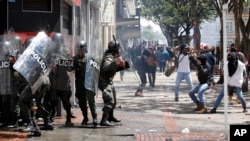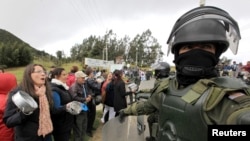BOGOTA —
Thousands of Colombian farmers and state workers marched through Bogota on Thursday, banging pots and pans as they converged on the capital after 11 days of increasingly violent protests against agricultural and trade policies they say have left them impoverished.
Students wearing balaclavas pelted shop windows with rocks near the capital's main square and clashed with riot police who fired tear gas to disperse them.
“Long live the farmers' strike! Food sovereignty,” they chanted, holding up protest banners.
President Juan Manuel Santos, who has been unable to end the so-called national strike that has united potato growers, milk producers, teachers and health workers, acknowledged agriculture is in crisis, but called for peaceful dissent while talks about possible solutions are going on.
“The farm sector has been abandoned,” the center-right president said in a televised address early on Thursday. “The protests are valid ... but, via dialogue, we will resolve the problems ... We are in a storm, but we will persevere.”
Protesters wearing typical farmer attire of woolen ponchos, brimmed hats and rubber boots to show their solidarity, marched in 15 columns toward the Plaza Bolivar, where the presidential palace and Congress are located.
Farmers have blocked roads, snarling city-bound traffic and pressuring Santos three months before he must decide whether to run for a second term. The government's tough peace negotiations with Marxist FARC rebels are creating their own contentious national debate at the same time.
“My purchase power is zero, it's only enough to survive,” said Orlando Pamo, 50, an indigenous father of six from central Tolima province who earns less than the minimum wage farming citrus and other fruits. “The government wants us off the land so it can be given to big business. We don't get the benefits companies get.”
Santos said he will lift import duties on 23 products, including some fertilizers and pesticides, to help lower crop production costs. He also is working to find more permanent solutions for the farm sector's problems.
Clashes between police and protesters over removal of the barricades resulted in at least one death and scores of injuries and arrests since the strike began on Aug. 19.
Looting was reported in several towns and blocked roads have prevented food getting to market, raising prices for consumers. Defense Minister Juan Carlos Pinzon has accused the FARC rebels of infiltrating the protests and seeking to rope peaceful farmers into their struggle against the government.
“Please, let's not fall into the hands of the violent,” said Santos. “Do not allow them to gain strength from these protests because it will distort the entire meaning of the demonstration and it leads to unnecessary confrontations that have led to deaths.”
Second Wave
The already grueling life of farming families has become harder in recent years since income from harvests has failed to cover costs of fertilizers and transportation.
Potato, corn and milk producers complain that free trade agreements with Europe and the United States have made it almost impossible to compete with cheaper imports. Droughts followed by unusually heavy rains have also made farming conditions difficult over the past several years.
The demonstrations are the second wave of national strikes this year against agricultural and economic policies.
“More demonstrations will follow in the coming days if there is no response from the government,” said Julio Roberto Gomez, head of the nation's second biggest union confederation, as protesters banged pots and pans behind him.
Even though Santos has made improving the conditions of the poor and cutting the jobless rate a priority, difficulties for farmers are unlikely to change in the coming months.
Finance Minister Mauricio Cardenas said it would be impossible to meet all demands from the different protest groups.
“The country is on the right track and the economy is an example worldwide,” he said on local radio. “But if you add up everything they want, there's no way to give them it all. They are seeking significant resources. There isn't enough money to cover the demands of all the sectors.”
Students wearing balaclavas pelted shop windows with rocks near the capital's main square and clashed with riot police who fired tear gas to disperse them.
“Long live the farmers' strike! Food sovereignty,” they chanted, holding up protest banners.
President Juan Manuel Santos, who has been unable to end the so-called national strike that has united potato growers, milk producers, teachers and health workers, acknowledged agriculture is in crisis, but called for peaceful dissent while talks about possible solutions are going on.
“The farm sector has been abandoned,” the center-right president said in a televised address early on Thursday. “The protests are valid ... but, via dialogue, we will resolve the problems ... We are in a storm, but we will persevere.”
Protesters wearing typical farmer attire of woolen ponchos, brimmed hats and rubber boots to show their solidarity, marched in 15 columns toward the Plaza Bolivar, where the presidential palace and Congress are located.
Farmers have blocked roads, snarling city-bound traffic and pressuring Santos three months before he must decide whether to run for a second term. The government's tough peace negotiations with Marxist FARC rebels are creating their own contentious national debate at the same time.
“My purchase power is zero, it's only enough to survive,” said Orlando Pamo, 50, an indigenous father of six from central Tolima province who earns less than the minimum wage farming citrus and other fruits. “The government wants us off the land so it can be given to big business. We don't get the benefits companies get.”
Santos said he will lift import duties on 23 products, including some fertilizers and pesticides, to help lower crop production costs. He also is working to find more permanent solutions for the farm sector's problems.
Clashes between police and protesters over removal of the barricades resulted in at least one death and scores of injuries and arrests since the strike began on Aug. 19.
Looting was reported in several towns and blocked roads have prevented food getting to market, raising prices for consumers. Defense Minister Juan Carlos Pinzon has accused the FARC rebels of infiltrating the protests and seeking to rope peaceful farmers into their struggle against the government.
“Please, let's not fall into the hands of the violent,” said Santos. “Do not allow them to gain strength from these protests because it will distort the entire meaning of the demonstration and it leads to unnecessary confrontations that have led to deaths.”
Second Wave
The already grueling life of farming families has become harder in recent years since income from harvests has failed to cover costs of fertilizers and transportation.
Potato, corn and milk producers complain that free trade agreements with Europe and the United States have made it almost impossible to compete with cheaper imports. Droughts followed by unusually heavy rains have also made farming conditions difficult over the past several years.
The demonstrations are the second wave of national strikes this year against agricultural and economic policies.
“More demonstrations will follow in the coming days if there is no response from the government,” said Julio Roberto Gomez, head of the nation's second biggest union confederation, as protesters banged pots and pans behind him.
Even though Santos has made improving the conditions of the poor and cutting the jobless rate a priority, difficulties for farmers are unlikely to change in the coming months.
Finance Minister Mauricio Cardenas said it would be impossible to meet all demands from the different protest groups.
“The country is on the right track and the economy is an example worldwide,” he said on local radio. “But if you add up everything they want, there's no way to give them it all. They are seeking significant resources. There isn't enough money to cover the demands of all the sectors.”






